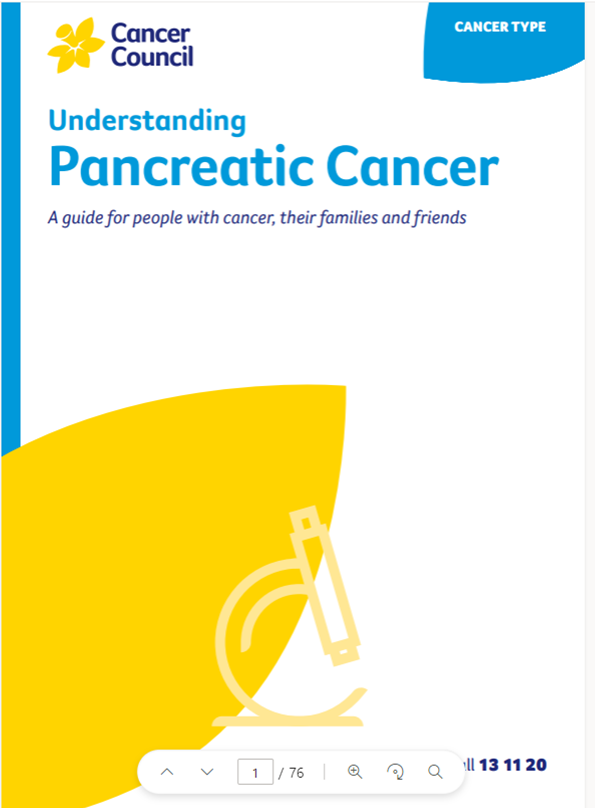- Home
- Pancreatic cancer
- Diagnosis
- Staging and prognosis
Pancreatic cancer staging and prognosis
The test results will show what type of pancreatic cancer it is, where in the pancreas it is, and whether it has spread. This is called staging, and it helps your doctors work out the best treatment options for your situation.
Learn more about:
TNM system for staging pancreatic cancer
Pancreatic cancer is commonly staged using the TNM system, with each letter given a number that shows how advanced the cancer is:
- T stands for Tumour and refers to the size of the tumour or how close it is to major blood vessels. It will be given a score of T0–4. The higher the number, the more advanced the cancer is.
- N stands for Nodes and refers to whether the cancer has spread to lymph nodes. N0 means the cancer has not spread to nearby lymph nodes; N1 means the cancer has spread to 1–3 nodes, N2 means the cancer has spread to 4 or more lymph nodes.
- M stands for Metastasis. M0 means the cancer has not spread to other parts of the body; M1 means it has.
The TNM scores are combined to work out the overall stage of the cancer, from stage 1 to stage 4. If you need help to understand staging, ask someone in your treatment team to explain it in a way that makes sense to you. You can also call Cancer Council 13 11 20.
Stages of pancreatic cancer
| stage 1 | Cancer is small and found only in the pancreas. | Stage 1–2 cancers are considered early pancreatic cancer. They may also be called resectable, which means surgery to remove the cancer may be an option if you are well enough. About 1 in 5 pancreatic cancers are stage 1–2 when first diagnosed. |
| stage 2 | Cancer is large but has not spread outside the pancreas; or it is small and has spread to a few nearby lymph nodes. | |
| stage 3 | Cancer has grown into nearby major blood vessels or into a lot of nearby lymph nodes. | Some stage 3 cancers are borderline resectable cancers, which means surgery to remove the cancer may be an option if other treatment can shrink the cancer first. Other stage 3 cancers are called locally advanced, which means that surgery cannot remove the cancer, but treatments can relieve symptoms. About 30% of pancreatic cancers are stage 3 when first diagnosed. |
| stage 4 | The cancer has spread to more distant parts of the body, such as the liver, lungs or lining of the abdomen. There may or may not be cancer in the lymph nodes. | This is called metastatic cancer. Surgery cannot remove the cancer, but treatments can relieve symptoms. About half of all pancreatic cancers are stage 4 when first diagnosed. |
Prognosis
Prognosis means the expected outcome of a disease. You may wish to discuss your prognosis with your doctor, but it is not possible for anyone to predict the exact course of the disease.
To work out your prognosis, your doctor will consider:
- test results
- the type, stage and location of the cancer
- how the cancer responds to initial treatment
- your medical history
- your age and general health.
As symptoms can be vague or go unnoticed, most pancreatic cancers are not found until they are advanced, which usually means treatment cannot remove all the cancer. If the cancer is diagnosed at an early stage and can be surgically removed, the prognosis may be better.
Discussing your prognosis and thinking about the future can be challenging and stressful. It is important to know that although the statistics for pancreatic cancer can be frightening, they are an average and may not apply to your situation. Talk to your doctor about how to interpret any statistics that you come across.
When pancreatic cancer is advanced, treatment will usually aim to control the cancer for as long as possible, relieve symptoms and improve quality of life. This is known as palliative treatment.
→ READ MORE: Your health care team
Podcast: Coping with a Cancer Diagnosis
Listen now
More resources
Prof Lorraine Chantrill, Honorary Clinical Professor, University of Wollongong, and Head of Department, Medical Oncology, Illawarra Shoalhaven Local Health District, NSW; Karen Baker, Consumer; Michelle Denham, 13 11 20 Consultant, Cancer Council WA; Prof Anthony J Gill, Surgical Pathologist, Royal North Shore Hospital and The University of Sydney, NSW; A/Prof Koroush Haghighi, Liver, Pancreas and Upper Gastrointestinal Surgeon, Prince of Wales and St Vincent’s Hospitals, NSW; Dr Meredith Johnston, Radiation Oncologist, Liverpool and Campbelltown Hospitals, NSW; Dr Brett Knowles, Hepato-Pancreato-Biliary and General Surgeon, Royal Melbourne Hospital, Peter MacCallum Cancer Centre, and St Vincent’s Hospital, VIC; Rachael Mackie, Upper GI – Clinical Nurse Consultant, Peter MacCallum Cancer Centre, VIC; Prof Jennifer Philip, Chair of Palliative Care, University of Melbourne, and Palliative Medicine Physician, St Vincent’s Hospital, Peter MacCallum Cancer Centre and Royal Melbourne Hospital, VIC; Lucy Pollerd, Social Worker, Peter MacCallum Cancer Centre, VIC; Rose Rocca, Senior Clinical Dietitian – Upper GI, Peter MacCallum Cancer Centre, VIC; Stefanie Simnadis, Clinical Dietitian, St John of God Subiaco Hospital, WA.
View the Cancer Council NSW editorial policy.
View all publications or call 13 11 20 for free printed copies.

